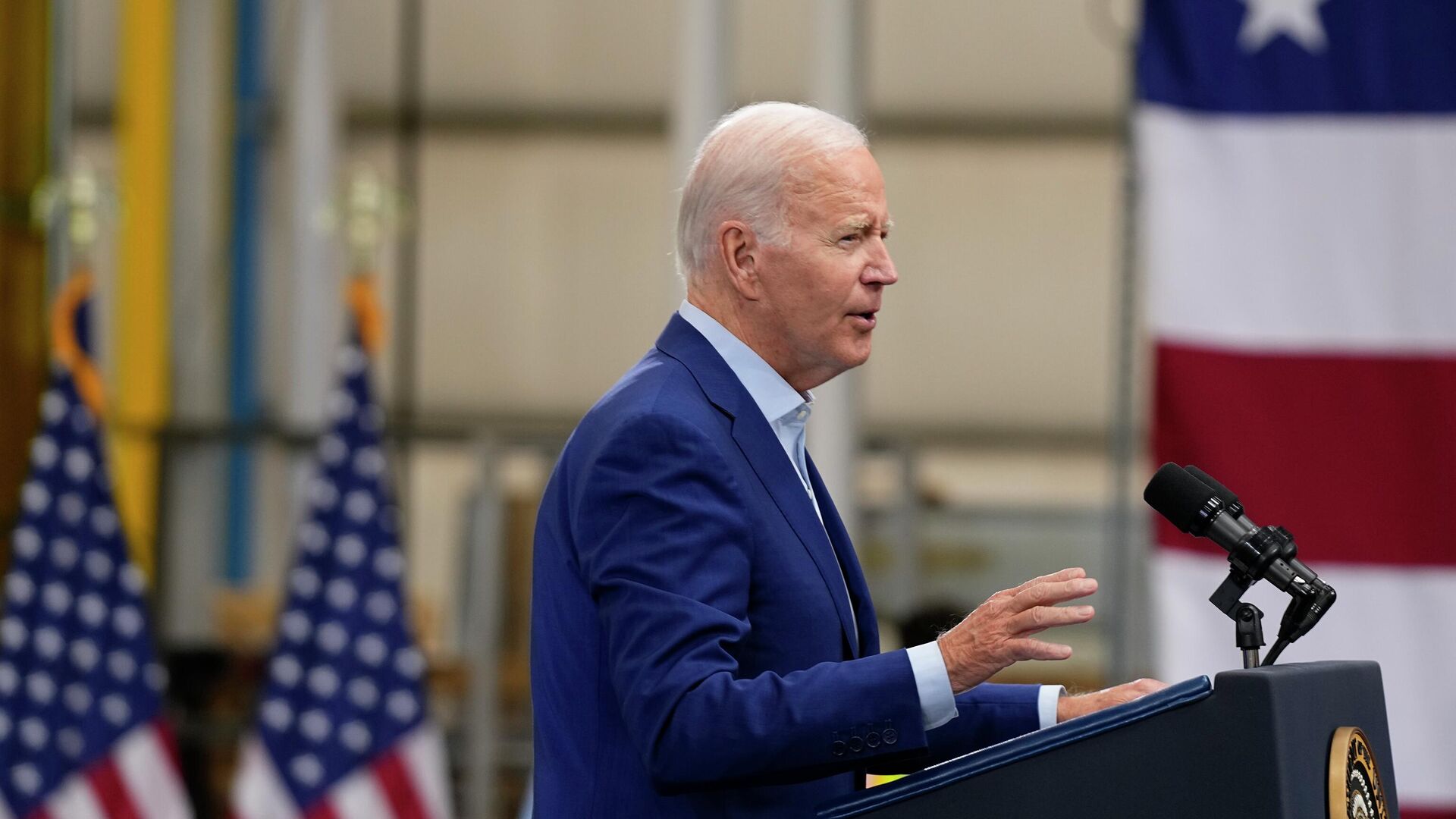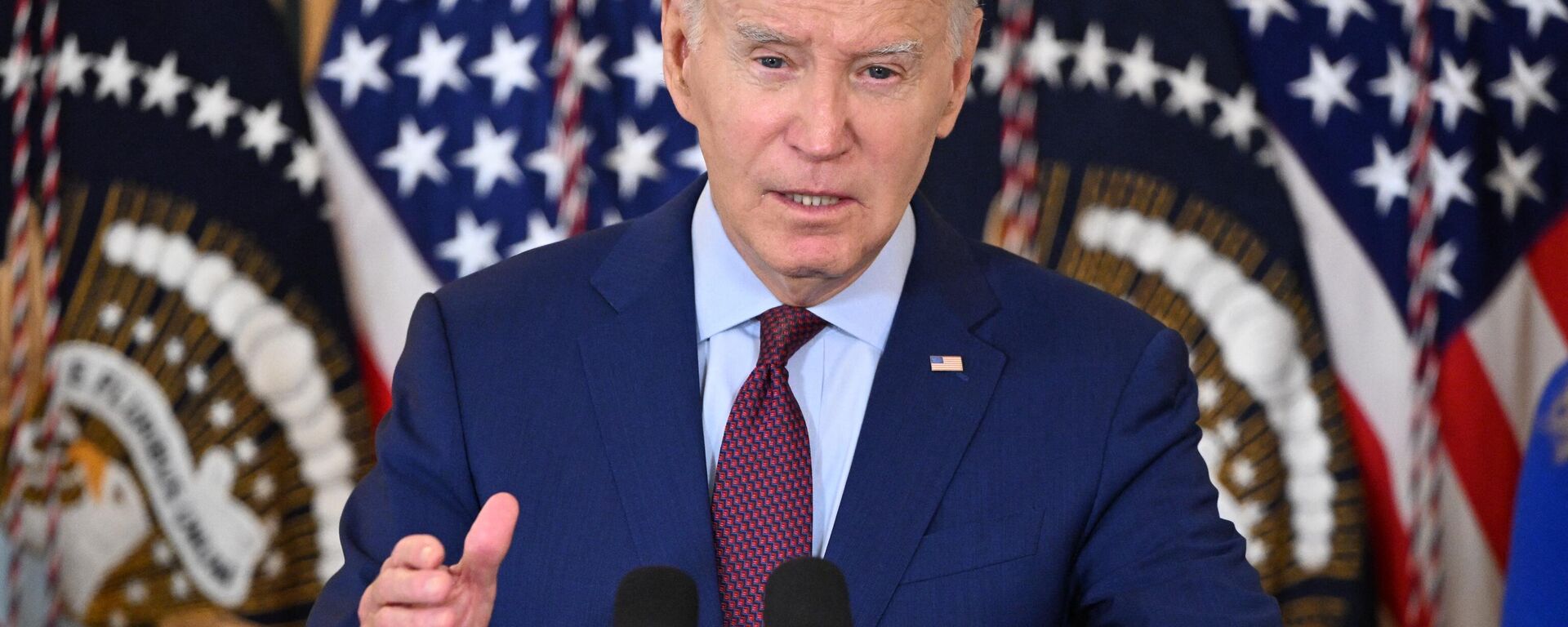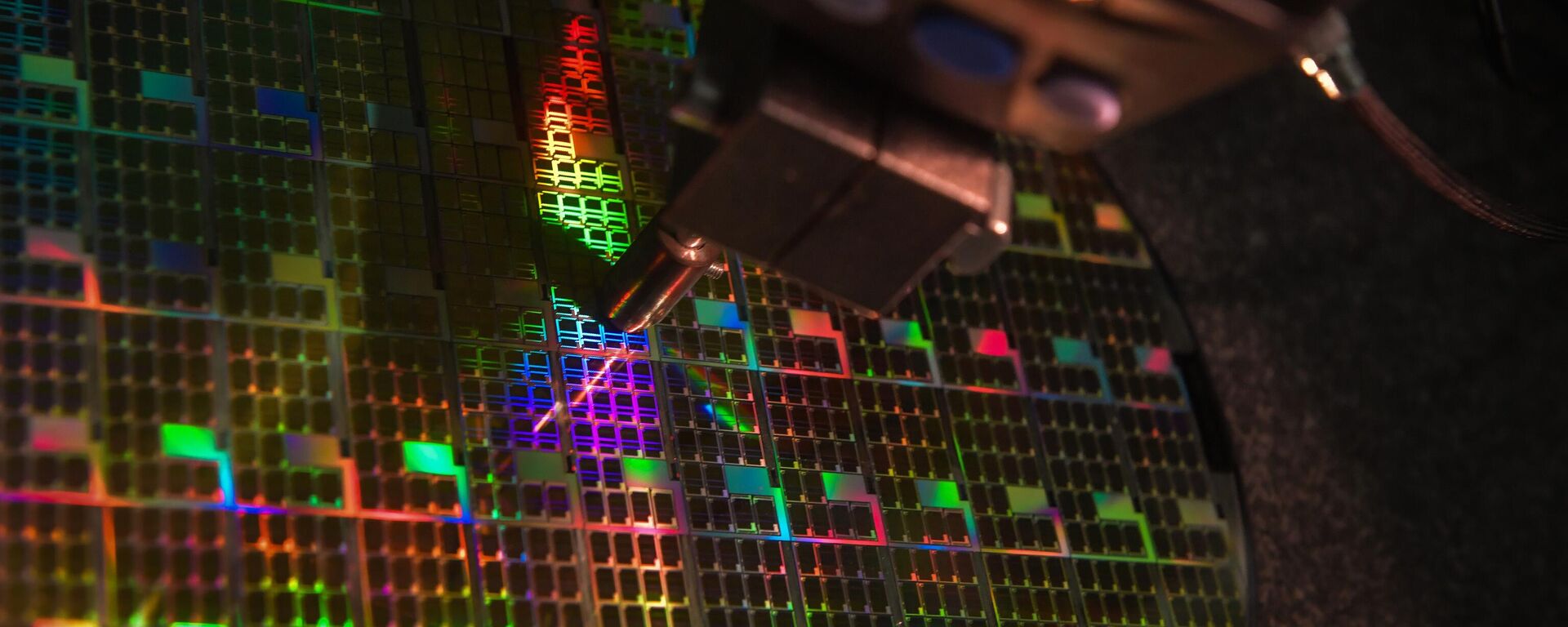https://sputnikglobe.com/20230811/bidens-crackdown-on-chinese-tech-investment-caused-by-tussle-for-votes-and-power-1112510609.html
Biden's Crackdown on Chinese Tech Investment Caused by 'Tussle for Votes and Power'
Biden's Crackdown on Chinese Tech Investment Caused by 'Tussle for Votes and Power'
Sputnik International
Biden administration is politicizing bilateral trade, as seen by the new curbs on investing in China's high-tech, Associate Professor of the Institute of International Relations of Nanjing University Gong Honglie told Sputnik.
2023-08-11T10:00+0000
2023-08-11T10:00+0000
2023-08-11T10:00+0000
economy
us
joe biden
china
high-tech
artificial intelligence (ai)
security threats
https://cdn1.img.sputnikglobe.com/img/07e7/08/0a/1112510711_0:160:3072:1888_1920x0_80_0_0_9bff43a5aee0ea382b8cd6cc5515a580.jpg
In the context of the ongoing strategic rivalry between China and the United States, the Biden administration is politicizing bilateral trade, transferring it to the realm of a national security issue, Associate Professor of the Institute of International Relations of Nanjing University Gong Honglie told Sputnik.Weighing in on President Joe Biden's executive order on Wednesday limiting US investments in China's high-tech, the expert underscored:Furthermore, Biden's new executive order could have been influenced by the internal political situation in the US, said the expert, pointing out that the goal to "decouple" the economies of the two countries has become a political tool wielded by Democrats and Republicans in the tussle for votes and influence.Indeed, as House Foreign Affairs Committee Chairman Michael McCaul praised the move, he said “the failure to include existing technology investments as well as sectors like biotechnology and energy is concerning."Biden warned in the executive order signed on August 9 that certain American investments could contribute to “the development of sensitive technologies and products in countries that develop them to counter United States and allied capabilities,” characterizing the situation as “a national emergency.” In the document, the People's Republic of China (PRC) is referred to as a "country of concern." In line with the curbs, investors would be obliged to notify the US government about certain types of transactions with China, as well as slap some investments with bans.Commenting the new decision of the Biden administration, a representative of the Chinese embassy in Washington told Sputnik that Beijing was extremely disappointed with the latest US restrictions on investment and sees Washington's course towards dissociation of the economies of the two countries. The US tech-investment curbs, is was noted, affect business decision-making, undermine the international trade and economic order, as well as the security of global production and supply chains.China was swift to rebuke President Joe Biden’s move, albeit stopping short of announcing any immediate counter-measures. The Chinese Foreign Ministry in its response hours after Biden signed off on the measure stated:The Chinese Commerce Ministry said the new US restrictions had been conceived to "decouple and sever supply chains under the cover of eradicating national risks."Washington's sanctions policy is unlikely to lead to a complete breakdown in relations, since neither side is interested in such a scenario, Gong believes.As a rule, many US companies seek out ways to circumvent previously imposed restrictions in order to continue normal business, he added.“Economic and trade sanctions are very difficult to unilaterally implement in practice. We can witness many American companies push back against the restrictive chip policy pursued by the US against China. They are also trying to use every means to circumvent government restrictions. From this point of view, I think the same situation can be expected in the investment sphere,” Gong underscored.The restrictions outlined in the executive order come hot on the heels of the spiraling US-China microchip rivalry, with Washington slapping restrictions and expanding investments in the domestic chip industry. In response, China’s Ministry of Commerce recently announced that it would restrict exports to the US of rare earth metals, such as gallium and germanium, which are used to manufacture semiconductors. “China will obviously take a number of countermeasures in the trade and economic sphere, Gong told Sputnik."For example, China recently announced the introduction of expert control of rare metals - gallium and germanium. But here it is worth noting that any sanctions and countermeasures are in fact a 'double-edged sword'. in the short term, there may be political consequences, but in the long term, there may also be certain economic consequences. Therefore, China is still attempting to exercise restraint in the hopes that the United States can be urged to show respect for market economy laws and the principles of fair competition, and jointly promote the development of world trade and exchanges,” Gong concluded.
https://sputnikglobe.com/20230809/new-stage-of-trade-war-set-us-to-ban-investments-in-chinas-high-tech-1112478353.html
https://sputnikglobe.com/20230808/cruel-realities-await-us-partners-in-anti-china-semiconductor-trade-wars-1112447346.html
china
Sputnik International
feedback@sputniknews.com
+74956456601
MIA „Rosiya Segodnya“
2023
News
en_EN
Sputnik International
feedback@sputniknews.com
+74956456601
MIA „Rosiya Segodnya“
Sputnik International
feedback@sputniknews.com
+74956456601
MIA „Rosiya Segodnya“
american investments, sensitive technologies, china high tech companies, china security risk narrative, investment restrictions, politicizing bilateral trade
american investments, sensitive technologies, china high tech companies, china security risk narrative, investment restrictions, politicizing bilateral trade
Biden's Crackdown on Chinese Tech Investment Caused by 'Tussle for Votes and Power'
President Biden notched up Washington’s trade confrontation with Beijing on Wednesday, setting in place new curbs on US investment in high-tech industries in China that ostensibly could be used to enhance Beijing’s military capabilities. Gong Honglie of Nanjing University weighed in on what he believes were the real reasons behind the crackdown.
In the context of the ongoing
strategic rivalry between China and the United States, the Biden administration is politicizing bilateral trade, transferring it to the realm of a national security issue, Associate Professor of the Institute of International Relations of Nanjing University
Gong Honglie told
Sputnik.
Weighing in on President Joe Biden's executive order on Wednesday limiting US investments in China's high-tech, the expert underscored:
Due to the extensive and close economic and trade ties between the two countries, all decisions linked to these spheres cannot be justified by 'security issues'... This time around, the Biden administration has further expanded the scope of curbs on investment in China to include semiconductors, artificial intelligence, and other sensitive technologies deemed critical.
Furthermore, Biden's new executive order could have been influenced by the internal political situation in the US, said the expert, pointing out that the goal to "decouple" the economies of the two countries has become a political tool wielded by Democrats and Republicans in the tussle for votes and influence.
"Currently, the US hawkish policy towards China is carried out in the hope of decoupling the economies of the two countries. It was these considerations that prompted Biden's decision. After the executive order was signed, a chorus of voices within the Republican Party immediately claimed that this was not enough, urging more sweeping sanctions," Gong Honglie said.
Indeed, as House Foreign Affairs Committee Chairman Michael McCaul praised the move, he said “the failure to include existing technology investments as well as sectors like biotechnology and energy is concerning."
President Joe Biden signed off on the executive order on Wednesday that limits US venture capital and private equity investments in Chinese companies covering semiconductors and micro electronics, quantum information technologies and certain artificial intelligence (AI) systems. While Biden administration officials stressed that the move was conceived to safeguard national security, Beijing expressed grave concerns and said it reserved the right to take corresponding measures.
Biden warned in the
executive order signed on August 9 that certain American investments could contribute to “
the development of sensitive technologies and products in countries that develop them to counter United States and allied capabilities,” characterizing the situation as “
a national emergency.” In the document, the People's Republic of China (PRC) is referred to as a "
country of concern." In line with the curbs, investors would be obliged to notify the US government about certain types of transactions with China, as well as slap some investments with bans.
Commenting the new decision of the Biden administration, a representative of the Chinese embassy in Washington told Sputnik that Beijing was extremely disappointed with the latest US restrictions on investment and sees Washington's course towards dissociation of the economies of the two countries. The US tech-investment curbs, is was noted, affect business decision-making, undermine the international trade and economic order, as well as the security of global production and supply chains.
China was swift to rebuke President Joe Biden’s move, albeit stopping short of announcing any immediate counter-measures. The Chinese Foreign Ministry in its response hours after Biden signed off on the measure stated:
"China is strongly dissatisfied with and resolutely opposed to the US' insistence on introducing restrictions on investment in China... This is blatant economic coercion and technological bullying."
The Chinese Commerce Ministry said the new US restrictions had been conceived to "decouple and sever supply chains under the cover of eradicating national risks."
"[The] US is defying its advocacy of maintaining the market economy with the principle of fair competition, affecting ordinary business decisions of companies, destroying international trade orders and seriously disrupting the safety of global supply chains," the ministry said.
Washington's sanctions policy is unlikely to lead to a complete breakdown in relations, since neither side is interested in such a scenario, Gong believes.
"It is unlikely that bilateral relations will be completely severed… However, as part of the concept of a tough Washington policy towards Beijing, the Biden administration will continue to pursue measures aimed at curbing China's development in various important areas. Today, neither China nor the United States would like to completely break off economic ties, and cooperation will continue in the future. The likelihood of dramatic changes after the signing of this law is slight, but undoubtedly cooperation between the two nations will be impacted," the international relations expert said.
As a rule, many US companies seek out ways to circumvent previously imposed restrictions in order to continue normal business, he added.
“Economic and trade sanctions are very difficult to unilaterally implement in practice. We can witness many American companies push back against the restrictive chip policy pursued by the US against China. They are also trying to use every means to circumvent government restrictions. From this point of view, I think the same situation can be expected in the investment sphere,” Gong underscored.
The restrictions outlined in the executive order come hot on the heels of
the spiraling US-China microchip rivalry, with Washington slapping restrictions and expanding investments in the domestic chip industry. In response, China’s Ministry of Commerce recently announced that it would restrict exports to the US of
rare earth metals, such as gallium and germanium, which are used to manufacture semiconductors.
“China will obviously take a number of countermeasures in the trade and economic sphere, Gong told Sputnik.
"For example, China recently announced the introduction of expert control of rare metals - gallium and germanium. But here it is worth noting that any sanctions and countermeasures are in fact a 'double-edged sword'. in the short term, there may be political consequences, but in the long term, there may also be certain economic consequences. Therefore, China is still attempting to exercise restraint in the hopes that the United States can be urged to show respect for market economy laws and the principles of fair competition, and jointly promote the development of world trade and exchanges,” Gong concluded.






